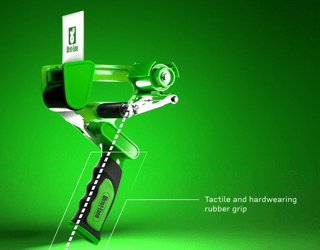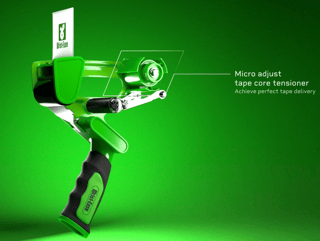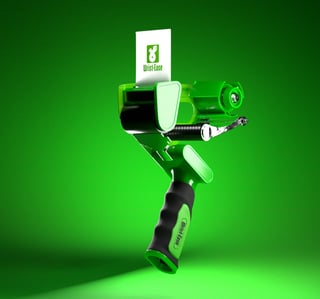How to Prevent Repetitive Stress Injury in the Warehouse
In the busy environment of warehouses, efficiency is key. Workers often find themselves engaged in repetitive tasks that are essential for smooth operations. However, with these repetitive tasks comes the risk of repetitive stress injuries (RSIs), which can have detrimental effects on employee health and productivity. Here are some other examples of how RSIs can manifest in warehouse settings:
The Key Operational Risk Factors in Warehouses

Picking and Packing
Workers involved in picking and packing orders often perform repetitive motions such as lifting, bending, and reaching. This can lead to strain on the back, shoulders, and arms. Prolonged periods of picking and packing without proper rest and ergonomic equipment can increase the risk of RSIs such as muscle strains and sprains. To manage these issues, ergonomic training to educate workers on proper lifting techniques, posture, and workstation setup is essential.
Stacking and Unstacking
Employees tasked with stacking and unstacking boxes or pallets may be at risk for RSIs, particularly in the shoulders, arms, and wrists. The repeated lifting and stacking of heavy items can lead to muscle fatigue and strain over time. To manage these issues, ergonomic training to educate workers on proper lifting techniques, posture, and workstation setup is essential. Investment in ergonomic equipment such as adjustable workstations, lifting aids, and supportive seating can significantly reduce strain on the body and safeguard your warehouse teams.
Scanning and Labelling
Warehouse workers responsible for scanning barcodes and labelling products may engage in repetitive hand and arm movements. Constantly gripping handheld scanners and applying labels can contribute to conditions like tendonitis and carpal tunnel syndrome. To offset this, encourage regular job rotation to allow workers to alternate between tasks and avoid prolonged exposure to repetitive motions.
Operating Machinery
Operating machinery such as forklifts, pallet jacks, and conveyor belts requires repetitive movements and prolonged periods of sitting or standing in fixed positions. This can lead to RSIs such as back pain, neck strain, and joint stiffness if proper ergonomic measures are not in place. A key to mitigating this risk is to conduct regular ergonomic assessments to identify potential hazards and implement preventive measures.
Sorting and Repackaging
Employees involved in sorting items or repackaging products may perform repetitive tasks such as lifting, twisting, and bending. These movements can strain the muscles and joints, increasing the risk of RSIs over time. That’s why conducting regular ergonomic assessments is essential to identify potential hazards and implement preventive measures.
Inventory Management
Workers tasked with inventory management may spend hours counting and organising products, often in awkward positions or confined spaces. The repetitive nature of these tasks can lead to muscle imbalances and postural issues, increasing the likelihood of RSIs. Companies seek to manage this risk by fostering a culture of safety and encouraging open communication between management and employees regarding any discomfort or pain experienced during work.
In addressing the various sources of repetitive strain injuries in warehouses and implementing proactive measures to promote ergonomic practices and employee well-being, businesses can create a safer and healthier work environment for their workforce and ensure the long-term wellbeing of their workforce, improving morale and driving better staff satisfaction in the long term.
Essential Processes in Focus: Carton Sealing

The process of carton sealing, while seemingly simple, involves repetitive motions that can put strain on the wrists, hands, and arms of workers. The constant bending, reaching, and sealing of boxes can lead to RSIs if proper precautions are not taken.
The Dangers of Repetitive Processes like Carton Sealing
Carton sealing is a crucial step in warehouse logistics, ensuring that goods are securely packaged and ready for shipment. However, the repetitive nature of this task can take a toll on workers' bodies over time. Some of the common injuries associated with carton sealing and other repetitive tasks include:
1. Carpal Tunnel Syndrome
This is a condition that occurs when the median nerve, which runs from the forearm into the palm of the hand, becomes compressed at the wrist. The repetitive motions involved in carton sealing can contribute to the development of carpal tunnel syndrome.
2. Tendonitis
Tendonitis, or inflammation of the tendons, can occur as a result of overuse and repetitive strain. The repetitive gripping and squeezing motions required during carton sealing can lead to tendonitis in the hands and wrists.
3. Muscle Strain
The repetitive nature of carton sealing can cause muscle strain and fatigue, particularly in the hands, wrists, and arms. Over time, this can lead to chronic pain and discomfort.
Preventing Repetitive Stress Injury with the Wrist-Ease™ Hand Tape Applicator
Fortunately, there are measures that warehouses can take to prevent RSIs among their workforce. One such solution is the Wrist-Ease™ Hand Tape Applicator, designed to improve user safety and comfort during the carton-sealing process.
The Wrist-Ease™ Hand Tape Applicator offers several features that make it an ideal solution for reducing the risk of RSIs:
1. Ergonomic Design
The applicator has been ergonomically constructed through hundreds of hours of user research to reduce strain on the wrists, hands, elbows and wrist joints. Its innovative design allows for a more natural and comfortable grip, minimising the risk of repetitive stress injuries, reducing downtime and improving comfort at scale.
2. Adjustable Tension Control
Wrist-Ease™ is built with an adjustable tension support, providing added stability and reducing strain on the wrist joints during the sealing process. This means users have the flexibility to adjust tension for a smoother, more precise application for various requirements.
3. Ease-of-Use Features and Durability
The dispenser boasts a hardwearing magnetic plate for convenient storage on pack benches or forklift equipment, enhancing workplace safety while minimising the risk of accidents in bustling packaging environments. Further, its rugged build ensures it withstands the daily rigours of high-volume use, producing long-lasting performance and reliability
By investing in ergonomic solutions like Wrist-Ease™, warehouses can protect their workforce from the dangers of repetitive stress injuries while also improving productivity and efficiency.
We've aided industry leaders across diverse sectors in transitioning to more efficient, reliable and long-lasting packaging solutions. Discover how our expertise can elevate your processes and boost your safety. Reach out to us today via message, phone at 01543 396 700, or email at sales@allpack.uk.com to learn how we can optimise your packing processes.




